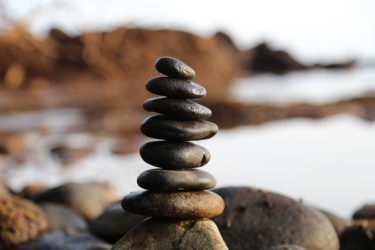We all know how easy it is to stay up late – and how pervasive the (conditioned – let’s be honest here) urge to check our phones, or do *just* one more thing, or catch up on that next episode. The truth is, we are diurnal beings – we sleep when it’s dark! Biologically, evolutionary, that is what we were designed to do and we forget the importance of sleep. We forget the importance of sleep -much of modern society is not desired to support this natural and inherent biorhythm that exists within all of us. Blue light screen, fluorescent lights, and access to limitless information at our fingertips are beautiful advances in our collective experience, but if we don’t approach these with mindful use and awareness, they can present a hug detriment to our sleep quality – which is one of the 3 foundational pillars of Ayurvedic wellness – sleep (nidra), diet (ahara), and right use of energy (brahmacharya).

Not only does deep, restful sleep offer the body an opportunity to regenerate, restore, and rebuild, it also offers the nervous system an opportunity to reset and assimilate physical and emotional experiences. It’s the space where we digest our days subconsciously, recover from physical activity and exertion, and sometimes even embark on journeys in the dream world that help resolve or offer clarity to our waking realities.
Too little or poor quality sleep affects memory and cognitive function and can lead to excess caloric intake, grogginess, and lethargy, and in the long term, diabetes, hormonal Imbalance and ultimately more rapid aging. None of which are appealing when it comes to living a healthy and vital life, if you ask me. Excessive blue light exposure after sunset can also affect melatonin production – the hormone that signals the body it’s time to sleep and induces feelings of tiredness. The good news is, there are very simple tools to re-align with the rhythms and of nature, and come back into balance within the body-mind.
Ayurveda and the importance of Sleep
According to Ayurveda, there are 3 distinct times of day that relate to each dosha, and cycle through a second time. You can read up on each here.
Kapha 6 -10 am & pm
Vata 2 – 6 am & pm
Pitta 10 -2 am & pm
Because Kapha ends around 10 pm, the dosha related to stability, support, the Earth and water elements, and rest, it is a useful time to transition into sleep and allow the body the full Pitta time period to rest, digest, and repair. As the night moves into the Vata time period, the primary focus in the body shifts from repair to dreaming and processing. While still very important, dreaming and REM sleep are not as deeply restful as the first few hours of sleep. You may have heard that the hours before midnight were important – and this is exactly why! While this is a general guideline, each dosha may also have more specific sleep needs and we must not ignore the importance of sleep.
Different needs for each Doshic type:
- Vata needs the most sleep 10 pm – 6 am is the recommended window
- Vata tend towards cold – be sure to have enough blankets, weight, and sleep with socks to retain vital energy and heat
- Pitta needs a little less and is recommended to sleep from 10-11 pm to 5:30 am
- Pitta tends towards hot, and needs a cooler sleep environment to rest deeply
- Kapha needs the least amount of sleep – 11 pm-12am to 4:30 am is a recommended window
Nighttime Ritual and Guidelines for deep, restful sleep:
- Roll the My Essential Oils Mood rollerball onto the bottoms of the feet and the scalp. This is soothing and supports relaxing the nervous system. You may also like to practice Abyangha (link to last article)
- Enjoy a cup of warm milk with spices like nutmeg, cardamom, and ginger to support deep sleep and digestion.
- Limit screen time and blue light to at least one or two hours before bed. If this is challenging, invest in blue light blocking glasses to protect your hormone balance of melatonin production.
- Enjoy a lighter, well cooked dinner, rather than a heavy meal right before bed. Mixing a heavy meal and sleep can confuse the body (are we sleeping or staying up to digest?) and lead to interrupted sleep
- Create and implement your own ritual to transition into the kapha time of day around 6 pm – maybe this is a short movement practice, some mediation, or unwinding with a cup of soothing tea
- Opt for red or amber lights and light bulbs over blue lights at night (Candlelight if possible is even better – experiment with candlelight one night a week and notice the effects you experience).
- Take a few deep, mindful breaths before bed. This prepares the body and lets it know it’s time to rest and let go of the day.
Find a nighttime ritual that feels nourishing for you, and you alone. Try it out for a week and adjust as needed. You’re a unique and multifaceted individual, and while these guidelines are very useful as a jumping off point, practice listening to your body’s wisdom and trust that it will let you know what is needed. Don’t ignore the importance of sleep, the body has a way of speaking to us – whether through dis-ease or feeling good, it is your most valuable guide.

Author: Alexandra Kazimir (YouVeda Wellness Contributor)




